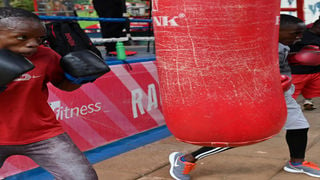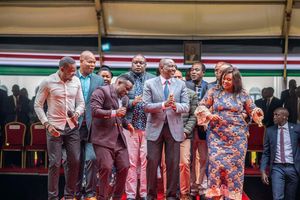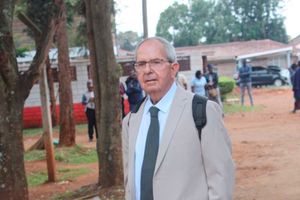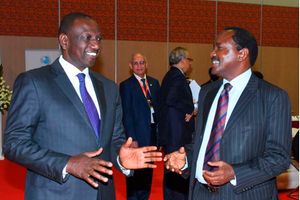
Kenya's boxer Christine Ongare Christine Ongare hits a punching bag during a training session at a gym in Nairobi on June 8, 2021, ahead of the 2020 Tokyo Olympic Games. A mother at 12, raised in Nairobi's hardscrabble suburbs to survive by her fists, Christine Ongare dreams of becoming the first African woman to win an Olympic medal in boxing. The 27-year-old Kenyan pugilist will have her chance in Tokyo- her first Games, and a moment she still cannot believe is coming true.
Sports
Premium
Ghetto to Olympics: Kenya's Ongare takes swing at Tokyo
What you need to know:
- Life was not easy growing up in such an unforgiving environment. Ongare said girls would be physically and sexually abused, and she had to learn from a young age to fend for herself.
- "I am the last born, we are four siblings. The rest were not around, so that made me be more tough, because I had no one to defend me," she said.
Nairobi
A mother at 12, raised in Nairobi's gritty suburbs to survive by her fists, Christine Ongare dreams of becoming the first African woman to win an Olympic medal in boxing.
The 27-year-old Kenyan will have her chance in Tokyo -- her first Games, and a moment she still cannot believe is coming true.
"I thought many times about giving up... but I continued the journey because I believed where I came from was more difficult than where I was going," Ongare told AFP after training at a gym in the Kenyan capital.
Standing at 1.57 metres (5ft 2ins) and weighing 51 kilograms (112 pounds), Ongare cut a diminutive figure growing up in Eastlands, one of Nairobi's rougher postcodes.
Life was not easy growing up in such an unforgiving environment. Ongare said girls would be physically and sexually abused, and she had to learn from a young age to fend for herself.
"I am the last born, we are four siblings. The rest were not around, so that made me be more tough, because I had no one to defend me," she said.
"Be it a girl or a boy, whoever came on my side, it didn't matter for me whether he was big or small, therefore I did all the means to try and defend myself."
'Resilience'
At 12, she fell pregnant with her son Maxwell, a chapter of her life she isn't as comfortable discussing.
The infant boy was raised by Ongare's mother, who took on the responsibility so her daughter could return to school.
"My son doesn't call me mum, he calls me by my name. He calls my mum, 'mum'," she said, laughing nervously.
As a teenager, she tried football and gymnastics but it was discovering boxing that sent her life in a different direction.
The sport gave Ongare a newfound "resilience" and helped her cope with the troubles at home, said Benjamin Musa, head coach of Kenya's Olympic boxing squad.
"That's what she really needed to get out of the tough life she was going through," said Musa, who has known Ongare since her early fighting days.
Ongare was first introduced to boxing through BoxGirls Kenya, an association in Eastlands that helps empower young girls through gloves and sparring.
Its founder, and Ongare's first coach, Alfred Analo Anjere, remembered a hard-working and punctual student: "She is a dedicated boxer," he said.
A younger Ongare didn't think she would make a career out of the jabs and hooks being thrown at the neighbourhood punching bags.
"It was just like for leisure, to abstain me from idleness, and like self defence," she said.
Speed and aggression
But she began taking the sport more seriously in her late teens and in 2012 competed in her first world championship.
That same year Elizabeth Andiego became the first Kenyan woman to qualify for the London Olympics, an inspiring moment for Ongare.
Andiego remembers giving her a Kenyan flag before departing for London and years later heard Ongare had held onto it as she harboured her own Olympic aspirations.
Eight years later, at the age of 26, Ongare earned her ticket to Tokyo, finishing third in the African qualifying tournament in the flyweight division.
Andiego says Ongare will need her aggressive attack in Tokyo, where she is light for her category. She also has the advantage of being quick on her feet.
"She's punching her way through the challenges... She knows that boxing is her life. It can change her life so she is really working hard on it," Andiego said. "She is so determined, so passionate."
Her goal in Tokyo is no small feat: "To get on the podium, because there has never been a woman representing Kenya, or even Africa, who has returned from the Games with a medal."
It has been a life's ambition for Ongare, who cannot imagine what direction her life would have taken without boxing.
"Maybe I could have been a drunkard woman, maybe married having many kids, I can't tell where I could be," she said.
In July, she will enter the Olympic ring with a message for all girls in Eastlands: "It doesn't matter where you are coming from or what you have faced in life, the thing is you just have to rise up, pick up the broken particles and then you move on. And you will make it."




